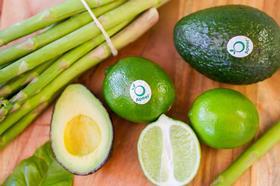
Apeel has announced US$30m in new funding from the International Finance Corporation (IFC), Temasek, and Astanor Ventures.
The group has said that it will use its new funding and technology to help smallholder farmers in emerging markets, who suffer from some of the highest levels of food insecurity and waste, extend crop shelf-life and gain access to new markets, including the US and Germany.
“It’s a misconception that people go hungry because we don’t grow enough food,' said James Rogers, founder and CEO of Apeel. 'The issue is the intermittency of supply and an inability to convert perishable assets into economic value.
“The harsh reality is that it is nearly impossible today for most smallholder farmers to get their produce to a marketplace that will pay for it before it spoils,' he continued. 'Apeel was founded on the belief that we can improve food security around the world by using technology to create opportunities for those who have limited or no access to the global food system.
'The new funding from IFC, Temasek, and Astanor will enable us to not only give smallholder farmers more time to market their fresh produce, but also greater access to higher-value markets previously out of reach because of inevitable perishability.”
In conjunction with IFC, Apeel’s new programmes for smallholder farmers will lead to the establishment of Apeel-powered supply chains in Sub-Saharan Africa, Mexico, Central and South America, and Southeast Asia.
Apeel’s technology will also be used to improve domestic supply chains, reducing food loss without the use of refrigeration, while increasing access to nutrition and improving domestic economic opportunities for smallholder farmers, informal retailers and consumers within developing countries.
With decreased food loss and improved quality throughout the supply chain, smallholder farmers will be able to access new market opportunities previously out of reach without a cold infrastructure or means for rapid transport.
“Innovative technologies can change the course of development in emerging markets and save livelihoods, economies, and in this case, food,” said Stephanie von Friedeburg, interim managing director and executive vice-president, and chief operating officer, of IFC. “We are excited to partner with Apeel to invest in a game-changing technology that can limit food waste by half, enhance sustainability, and mitigate climate change. By joining our forces and expertise, we will also help local farmers, distributors, and retailers preserve produce and expand exports to markets that were previously too far to reach.”
Apeel pointed out that smallholder farmers (SHFs) managing up to five hectares produce more than 50 per cent of the global fruit supply, yet agricultural workers still make up 65 per cent of all poor working adults and many smallholder farmers suffer from hunger and extreme poverty.
'Fresh fruits and vegetables offer SHFs much larger income opportunities than staple crops, and demand for fresh produce is increasing globally,' the group stated. 'The challenge is that growing something valuable is only beneficial if the farmer can access a market with a buyer.
'Without access to a refrigerated supply chain, much of what a SHF produces can only reach small local markets where the supply of locally grown crops often far exceeds demand. Because of perishability, these market dynamics lead to systemic poverty, significant amounts of food loss and waste, and even food insecurity for those who make their livelihoods from farming.'



